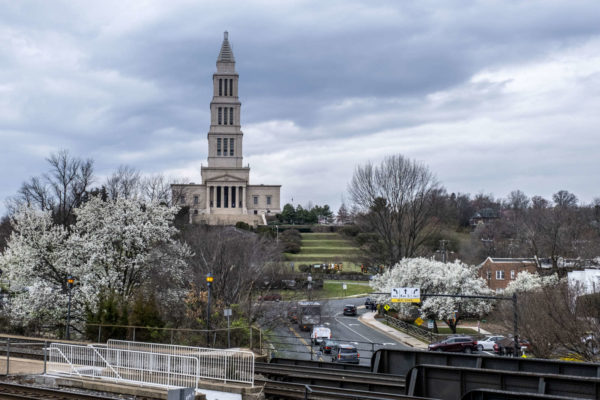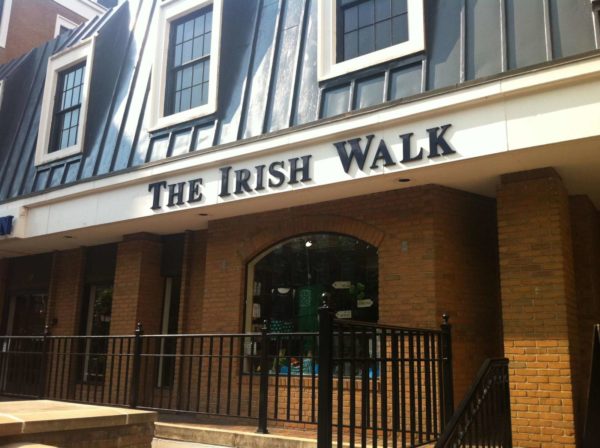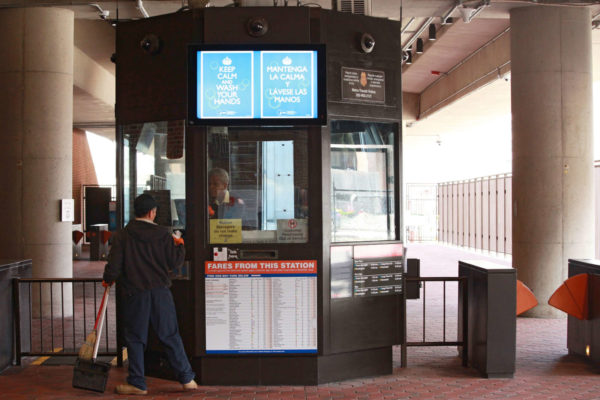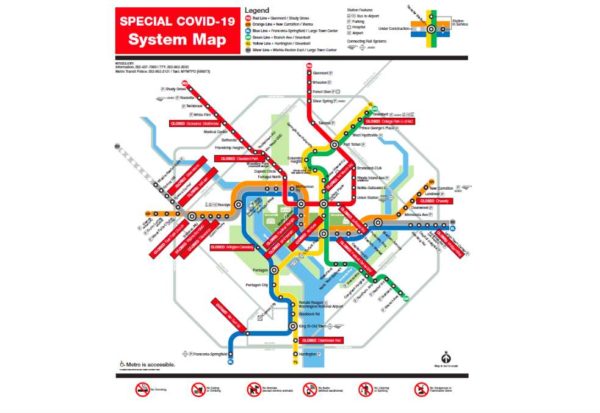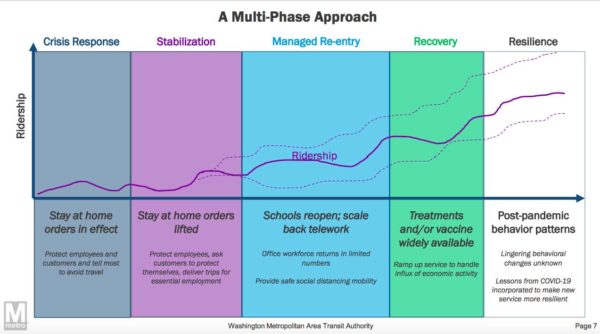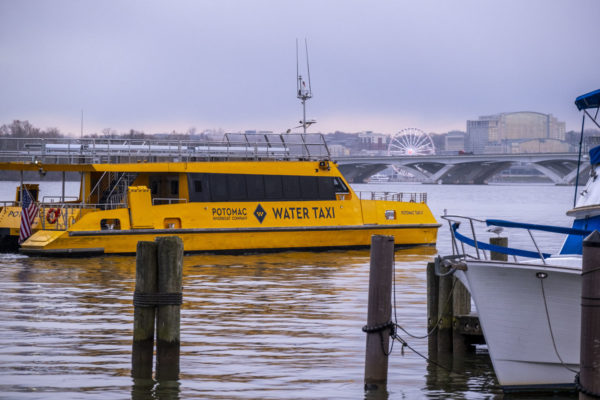Search Results for "summer metro shutdown "
One of the most visible congestion points in the city is about to get revamped.
On Tuesday, the Alexandria City Council unanimously approved roadway improvements the the intersection of King Street, Russell Road and Callahan Drive, as well as a conversion to one-way for the service road leading up to the George Washington National Masonic Memorial.
“I think it’ll be safer for one and all,” Alexandria City Councilwoman Del Pepper said.
Roadway improvements in the area include:
- Signal timing optimization to reduce vehicle delay by 45 seconds
- Upgraded crosswalks and pedestrian signals
- A curb extension for shorter crossing and to slow turning vehicles
- Bike facilities through the intersection
Improvements at the intersection have been in the works since 2015, when the city received a $1.2 million Federal Transit Administration grant. The next few years were spent collecting and analyzing data, and were met with delays due to “the combination of staff capacity and implementation of the King Street Metro Improvements Project and the 2019 Metro Summer Shutdown,” according to a city staff report.
The George Washington National Masonic Memorial Association wanted the access road shut down to vehicle traffic.
“Part of this project involves the access road around the traffic island, which connects the Memorial’s driveway to Callahan Drive,” the Association wrote in a letter to Council. “While the Memorial Association believes the modifications before Council for approval are a positive step, it is the viewpoint of the Memorial Association that this access road, which is used by motorists as a way to circumvent the traffic light at King and Callahan, should be permanently closed to vehicle traffic.”
Christopher Ziemann, the city’s Transportation Planning Division chief, said that the one-way conversion was a compromise.
Mayor Justin Wilson said that the traffic island in the center of the intersection will not be impacted, as it is designated as a national historic landmark.
“I think this is a step forward and certainly enjoys broad-based community support, which is great,” he said. “I appreciate staff’s efforts to build consensus on the changes on this intersection. I know this has been a long time coming.”
After 50 years in business, The Irish Walk at 415 King Street will close by the end of July.
“It is with a heavy heart that I inform you that after 50 years in business; The Irish Walk will be closing its doors on July 31, 2020,” owner Patty Theobald said in an email. “From the original owners, the Butler Family, to the Troy Family, to me and my staff, we have all enjoyed getting to know our customers and community over the last five decades.
Theobald said coronavirus was just the latest in a series of financial hurdles that were just too much for the business to withstand. The Irish Walk isn’t alone either, many businesses in the city are facing a slow recovery as sales remain low.
“The last couple of years have been financially hard on all of us,” Theobald said. From the government shutdown, to the summer closing of the Alexandria Metro stations, and now the pandemic; we all have suffered in ways we couldn’t have imagined,” Theobald said. “The Irish Walk is one business, in a long list of businesses that is finding it impossible to bounce back after this third financial hit.”
The store owners and staff left their customers with one last message of encouragement.
“We have fitted some of you with your first Irish dance shoes, ordered your wedding bands, watched your children grow, celebrated your anniversaries and helped you find the perfect gifts,” Theobald said. “We have appreciated hearing about your trips to Ireland and your family’s Irish histories and celebrating the big day with you…St. Patrick’s Day. It has been a joy.”
https://twitter.com/lisahfitz/status/1282725117328601090
Photo via The Irish Walk/Facebook
The Washington Metropolitan Area Transit Authority is interested in receiving more federal CARES Act funding, as the transit system has seen a 90% reduction in ridership and the transit system may not return to full functionality until next year, WMATA Board Chair Paul Smedberg told ALXnow.
On Saturday, WMATA unveiled a multi-phased COVID-19 recovery plan Monday, and it says that service may not fully resume until next year.
“Since Metro implemented its pandemic plan, ridership has fallen by 95% on Metrorail and by more than 70% on Metrobus,” according to the plan. “The return of pre-pandemic levels of community activities including travel will likely depend on the timing of easy access to testing, a widely-available vaccine and the building of immunity. The CDC suggests this may be the case by some time in 2021.”
The pandemic has also created an opportunity to expand Metro’s summer rail improvement shutdown. Last summer, all of Alexandria’s metro stations were shuttered for renovations, and this summer all nine Orange and Silver line stations west of the Ballston-MU station will be closed and Silver line service will be temporarily suspended, beginning on May 23 until September.
Smedberg, a former member of the Alexandria City Council, was named chair of the Metro board last year and said that the speed of the pandemic took him and the WMATA board by surprise.
ALXnow: When did Metro begin to get inklings that it was going to have to resort to emergency operations?
Smedberg: It was about the same time everyone else did, really. There was some chatter that there was a pandemic coming, and the staff started to prepare when everything really started to hit in the region at the end of February and the beginning of March.
ALXnow: Metro has only been around 53 years. The New York City subway system was around during the Spanish Flu pandemic of 1918. Have you been in consultation with other subway and service train providers around the country on best practices? Or have you simply been referring to your own emergency preparedness plan?
Smedberg: Metro obviously has plans in place for emergencies, but in terms of the scope of this, no. Immediately the general manager did put a team in place to manage the issue, our chief safety officer coordinated, and still does coordinate, the efforts in response to the COVID, the safety of workers and riders and making sure that people are still able to get around.
We’re an essential service for the area, whether it’s rail or bus, a lot of people are getting to hospitals, to their work via Metro. Metro is coordinating with the hospitals in the region to help get the essential workers to and from work with shuttles. This is pretty new for everyone. Paul Wiedefeld [Metro’s CEO and general manager] is talking to his counterparts around the country about various ways they’re dealing with the issue.
But it’s been very coordinated and also unique for Metro, because we’re a multi-jurisdictional entity. We’re coordinating not only internally, but externally with the Commonwealth of Virginia, the state of Maryland, the District of Columbia and the federal government. So, a lot of coordination is going on at that level as well, making sure that we’re in sync with the local transit agencies and other departments in the region. So, it’s really a multi-faceted effort, and I think they’ve been managing it quite well, actually.
ALXnow: The economy was booming before this implosion brought on by the virus. What did Metro’s 2020 future look like before the pandemic?
Smedberg: Metro after the (summer) shutdown and all the rehabilitation projects over the last couple of years and everything. Reliability is way up, safety is way up, ridership was up across the board, both bus and rail. We were seeing real strides. We had a few new initiatives that we were looking forward to help further enhance and increase options for riders, and this hit and everything ultimately had to be put on hold. We’ve seen quite a drop in ridership, about 90%, that other systems have and other buses systems have across the nation.
It’s been a real challenge. Obviously, we were able to take advantage of some of the CARES Act money that was made available to transit systems across the country. That’ll help stabilize things a little bit as we move forward, but it is definitely going to be a challenge. We’re very sensitive to how jurisdictions are having to deal with things financially. They, ultimately for the most part, are the ones paying the bill. So we’re very sensitive to what’s going on and we’re all dealing with the same challenge. So, it’s gonna be a year where we’re really gonna have to reflect on what we’re doing and why we’re doing it.
ALXnow: Metro received $877 million in federal CARES Act funds, and $110 million was earmarked to reimburse localities for the hit for on monies that they won’t be receiving due to Metro’s reduction in services. How else has Metro been impacted? Have you had any layoffs?
Smedberg: That money’s obviously been very helpful. There have been no layoffs or furloughs, and because of that a lot of those dollars will be put toward making sure people are still employed. That was one of the main purposes of it. We were able to credit some of the money back to the jurisdictions to help them with their subsidy.
I think right now we’re looking at various scenarios as to when ridership does start to come back, when will things be lifted enough? When are companies or organizations going to feel comfortable enough in having employees phase back into their office space and how that’s gonna look?
ALXnow: Do you need any more federal funds?
Smedberg: There’s talk of the possibility of a CARES Act 2, sort of the second phase. We would be interested in that and that would obviously be very helpful. I think the American Public Transportation Association is actively advocating for that right now and is working with Congress. They just sent a letter to Congress and the administration requesting in a bill $23.8 billion to address additional costs, because of revenue losses in excess of public transit funding provided by the CARES Act.
ALXnow: How much do you need out of that?
Smedberg: No idea. I’m not sure what the formula would look like for that. Metro is one of the nation’s larger systems, though.
ALXnow: With ridership down so significantly, how closely has Metro been continuing to sanitize stations, trains and buses?
Smedberg: That has been top of mind for quite a while now. We get regular updates from the safety officer on how those efforts are going, if there have been changes. That’ll likely be going on for quite some time. That was a concern from the very beginning, how to manage cleaning and sanitizing the cars and certain parts of the stations, and internally, because we have a decent number of folks who are deemed essential that have to be at work in person, and they cannot work remotely from home.
ALXnow: If you go to a hospital, the heroes right now are those on the front lines, the doctors and the nurses. Right now in Metro, the heroes are the bus drivers. Do you have enough bus drivers?
Smedberg: So far so good. We get updates constantly on the workforce and the number of people that are infected. We made changes operationally where people now are boarding the rear doors of buses so there’s less exposure to the drivers and the riders. There are no fares being collected right now for bus ridership, which is free. People with disabilities can still enter through the front doors.
The management is in constant contact with labor, and those relations are good. So far there’s been a lot of cooperation and communication and keeping everyone as safe as can be.
ALXnow: You’re also going to be expanding the summer closure of stations for track improvements. Can you talk to me about the opportunity for making some infrastructure improvements?
Smedberg: There was an originally planned shut down for a certain segment of the Orange and Blue lines, but with ridership down significantly, management has proposed an additional shutdown for further opportunities along the orange and blue line and in the silver line, taking advantage of that shutdown and the fact that ridership is down so significantly. It’s money that’s there, part of the capital program and will prevent future shutdown disruptions in service, potentially, in the future.
ALXnow: Do you anticipate future summer construction projects to continue, or will those capital funds be reallocated?
Smedberg: We haven’t really talked about that. I don’t think we’ve really gotten that far yet, to be honest.
ALXnow: In other words, has COVID-19 impacted your capital improvement program at all?
Smedberg: Not to date.
ALXnow: Virginia and other localities are preparing to reopen. How are you approaching that?
Smedberg: That’s the thing we’re looking at when people are going to start potentially going back to work in our three jurisdictions, and seeing what the reopening plans are for localities and how they’re managing things. Now, things are still changing so quickly, day-to-day, week-by-week.
It’s been very, very interesting. I’ve learned a great deal. The board now as it exists is a really good group. And everyone is playing their part and chipping in and we have really good working committees, and, more importantly, I think, we have really good management of Metro right now.
Staff photo by James Cullum
The Alexandria City Council has unanimously approved a license agreement to allow Potomac Riverboat Company’s water taxi to ferry commuters from the waterfront to the District Wharf in D.C.
The daily water taxi service, which begins on March 1, was first introduced to Alexandria during last summer’s Metro shutdown, and commuters will start sailing at 6 a.m.
“I’m glad we’re doing this,” said Alexandria Mayor Justin Wilson. “I look forward to personally doing it. It works out really well on council meeting days, because I can leave my car here (at City Hall) and take my boat from my day job directly here.”
Potomac Riverboat Company increased its water taxi fleet last April with the addition of four new yellow boats. It also runs the Cherry Blossom, Matthew Hayes, and other named vessels. A commuter pass valid from March 1 to Dec. 31 costs $295, and a round-trip ticket costs $10.
City staff maintain that water taxi commuters will not create parking issues in Old Town — a sticking point for Councilwoman Del Pepper.
“The more ways we can find to get people off our cement streets the better,” Pepper said. “I have for about a decade opposed this, and the reason has been because of concern that our streets and our parking lots would all be filled with people getting to this destination (the waterfront). I’m going to support it with the caveat that I hope staff will be following this, and if this becomes a problem for the neighbors, I want it brought back for discussion.”
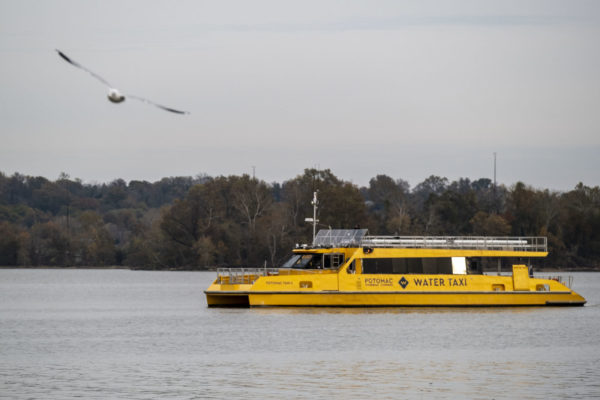
Interested in sailing to work? During last summer’s Metro Shutdown, Alexandria eased restrictions allowing for the Potomac Riverboat Company’s water taxi to ferry commuters from the city’s waterfront to the District Wharf.
Tonight, the city council will receive a report on extending the license agreement to allow for early morning water taxi commuting services to continue.
The agreement, which would allow for the water taxi to start running as early as 6:30 a.m., was “nearly unanimously” endorsed by the Waterfront Commission, according to a Dec. 31 letter submitted in the staff presentation to council.
The letter also said that there should be minimal parking impacts in Old Town.
“Specifically, staff found that 85% of commuters surveyed said they either walked or biked to the water taxi, and 90% of these commuters were former Metrorail riders,” Waterfront Commission Chair Stephen Thayer wrote. “Staff noted these former Metrorail riders did not stop riding Metrorail altogether, but simply boarded Metrorail at L’Enfant Plaza, which is a short shuttle bus ride away from the District’s Wharf.”
The Commission is also asking the city to consider a water taxi user reimbursement program. During the summer shutdown the daily $10 commuter round trip was reduced 80% with the reimbursement.
Potomac Riverboat Company operates four water taxis, in addition to the Cherry Blossom, Matthew Hayes, and other named vessels.
The Council will decide on the matter at a public hearing on Feb. 22.
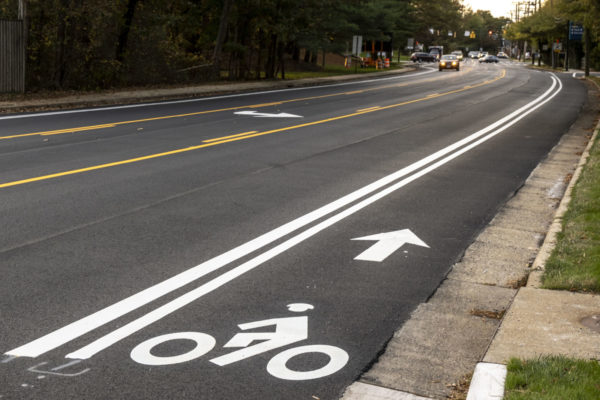
It was quite a year in Alexandria. It’s safe to say that 202o will be just as busy, but in the meantime let’s take a look at the top stories from the last year.
1. The Seminary Road Diet
Few local transportation stories have gotten as much attention as City Council’s 4-3 decision on the Seminary Road diet. The move seems simple enough — consolidating from four to two lanes in both directions between N. Quaker Lane and Howard Street with a turn lane in the middle and bike lanes on both sides. Public discord over the change prompted the creation of a Facebook page, which has dramatically turned up the temperature on the issue, even leading to City Councilwoman Amy Jackson to publicly call for a complete reversal on the decision and restart of the process.
See: More Work on Seminary Road This Spring If the State Will Pony Up the Cash
More: Virginia Theological Seminary Weighs In Favor of Seminary Road Diet
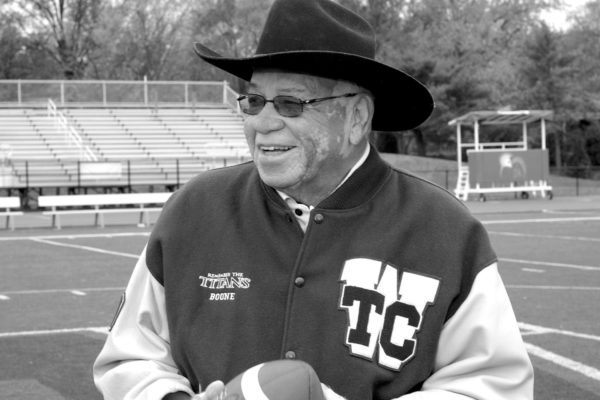
2. Legendary Titans Pass Away
Alexandria lost a number of inspiring figures in 2019, including members of the state championship-winning 1971 T.C. Williams High School football team. The team, who were immortalized in the 2000 film “Remember The Titans” starring Denzel Washington, lost coach Herman Boone, assistant coach Bill Yoast and players Petey Jones and Julius Campbell.
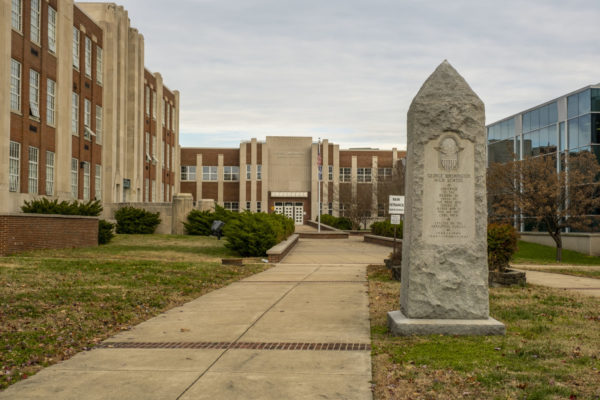
3. ACPS fully Accredited for First Time in 20 Years
It took two decades, and in September Alexandria City Public Schools system announced that all of the city’s public schools reached their state mandated benchmarks to be fully accredited for the 2019-2020 academic year. Superintendent Dr. Gregory C. Hutchings said that the success didn’t come by chance and that it took six superintendents and a lot of “planning, preparation and dedication for all students to experience success regardless of their life circumstances” to get ACPS where it is today.
All ACPS Schools Fully Accredited for First Time in 20 Years – ACPS Express https://t.co/mjsBbdCHM9
— Dr. Gregory C. Hutchings, Jr. (@DrHutchings) September 30, 2019
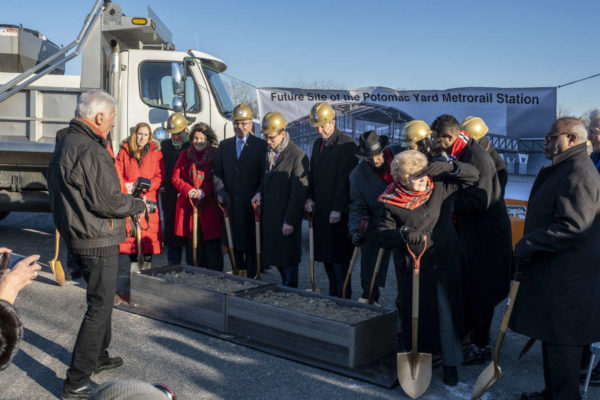
4. Ground Broken at Potomac Yard Metro Station
After decades of finalizing plans and making deals, ground was finally broken in December for the construction of the Potomac Yard Metro station. The plan is to open the $320 million station by spring 2022, and while development will result in the demolition of the Regal Potomac Yard movie theater, the area will positively be booming with the eventual addition of the Virginia Tech Innovation Campus, a new mixed-use redevelopment, Amazon HQ2 in Crystal City and much more.
“This has been a quarter-century in the making,” Mayor Justin Wilson said at the groundbreaking. “This is a big… deal.”
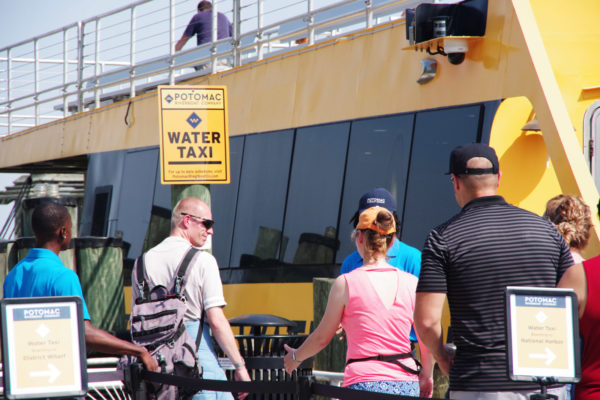
5. Alexandria’s Summer Metro Shutdown
Did you have to get creative in your commute over the summer? You weren’t alone. Thousands of commuters in the area were forced to make alternate plans so that Metro could make crucial improvements to all of the station platforms south of the Reagan National Airport station. The shutdown meant expanded Metro and DASH bus routes, morning trolley rides from the King Street station, Potomac Riverboat Company Water Taxi ferries from the Alexandria Waterfront into the District and more. The renovation is part of a $300-$400 million project to rebuild 20 outdoor platforms throughout the Metro system. Once reopened, commuters were introduced to new speakers for clearer public announcements and emergency notifications, stainless-steel platform shelters, passenger information display screens and energy-efficient LED lighting.
Alexandria's Metro stations are open again after a summer-long construction shutdown! How was your commute this morning? https://t.co/mwpM0mf7eM pic.twitter.com/fQMqsGT4bf
— The Zebra (@ZebraAlexandria) September 9, 2019
While more property owners have signed on to plans to shift Alexandria’s workforce to car-free, a report on those plans showed an increasing percentage of workers and residents in new developments driving alone compared to last year.
Some commercials and residential developments are required to have plans to get employees or residents to use non-car transportation to commute. These plans are called Transportation Management Plans (TMPs) and there are currently 75 developments in Alexandria with TMPs.
The report notes that over the last year 58.9% (out of 702 people surveyed) said they commuted to work driving alone, compared with 46.6% in 2018.
The report does state that these results could be inflated because the program is heavily weighted towards ten large office developments with TMPs, outweighing others, but the results still show riding alone dwarfing all other forms of transportation.
Among residents, driving alone and taking Metro increased over the last year, despite the Metro shutdown over the summer. The percentage of residents saying they carpool fell dramatically though, from over 40% to under 10%.
Staff acknowledged that there are several issues with the current TMP system, “including low compliance, a penalty structure that is less expensive than compliance, and poor incentives to comply.”
According to the report, staff is planning to make recommendations regarding the program next year to push larger, new developments to get employees and residents out of cars and into mass transit.
In related transportation news, the city has worked to sign more employers throughout Alexandria onto voluntary Transportation Demand Management (TDM) strategies. These plans guide employers and residential communities on how to reduce reliance on cars for employees, customers and residents.
There are currently 522 employers with TDMs, according to an update delivered to the Transportation Commission, up from 313 last year. These range from the indoor playground Scramble to federal agencies like the Department of Defense, National Science Foundation and Patent and Trademark Office.
Image via City of Alexandria
(Updated 11/20) This summer’s Metro shutdown could wind up netting the Potomac Riverboat Company a goal the company has been after for years: permanent early-morning service for its water taxi.
The company’s lease currently prohibits boats from coming in or out of docks before 9:30 a.m., which staff told the Waterfront Commission this morning (Tuesday) means the boats are usually used by tourists. But during the Metro shutdown, the city waived that restriction.
“The water taxi was well used,” staff said. “Most of the new users were Metro riders. They had up to 997 boardings a week [in June] and averaged 600 during the rest of the shutdown.”
During the shutdown, the city offered a reimbursement program that included $100 for a seasonal pass and $8 for round trip tickets. Current prices post Metro shutdown are notably pricier: $195 for an unlimited annual pass and $18 for a round trip pass.
The city previously required Potomac Riverboat Company to implement a parking plan for commuter parking, but 85 percent of the new riders biked or walked to the water taxi and the city reported there were no parking complaints or capacity issues related it.
Now, the staff said City Manager Mark Jinks has expressed interest in asking the council for an extension of the hours in the lease to allow operations to begin “before 6:30 a.m.” and to promote the water taxi as an alternative to driving.
“This is great,” said Waterfront Commission member Nathan Macek, also chair of the Planning Commission. “I’m happy to see it move forward. I think we’ve had an irrational fear [of utilizing the waterfront] and this pilot helped.”
The conversation also spurred discussion of a waterfront taxi that would connect with Prince William County and Fort Belvoir, along with locations further upriver like the Pentagon. Charlotte Hall, a member of the Waterfront Commission, said a company is looking at building a water taxi network up the western side of the Potomac River sometime in 2020 but would likely skip Alexandria in at least the first year of operation.
“Alexandria is not ready for this in 2020,” Hall said, “but others are.”
“We’re so restrictive on our lease covenants with when the boats can come and go,” said Macek. “I think the city contracts need to be less specific about that. Let boats come and go as they please, and I don’t think the city needs to regulate the boat spaces as strictly as they do.”
There was only one note of light dissent on the Waterfront Commission when Beth Gross, a representative on the Commission from the Founders Park Community Association, said the idea of boats coming and going from the docks like planes coming and going from the airport made her “a little worried.”
Staff photo by Jay Westcott


